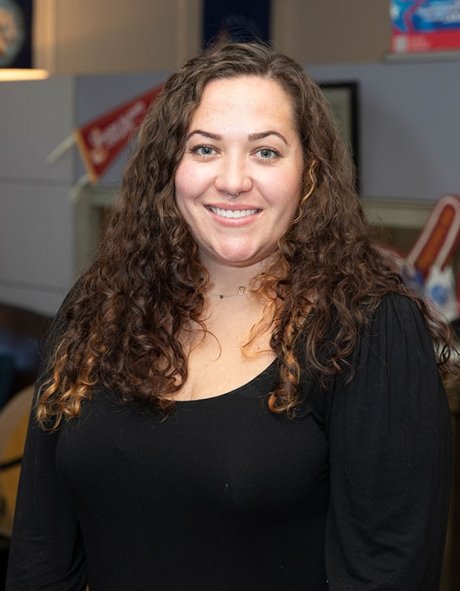
Former military police officer Aldaco supports vets and others through counseling.
Last year Giovani Monteiro, a RIC junior, was carrying emotional and mental baggage that impacted his personal and academic life.
He says his perspective changed after meeting Raven Aldaco, a military benefits liaison, a steady presence in the college’s Military Resource Center since 2022.
“The biggest impact Raven has had on me is helping me understand my emotions and who I am,” Monteiro says. The 22-year-old is a member of the Rhode Island Army National Guard and a nursing major. “She showed me that it was possible to move on from past trauma and use it as a foundation to move forward. I’ve learned to be more confident, accept myself and love and forgive others.”
Aldaco, a veteran who spent more than four years as a police officer in the U.S. Army, says she enjoys mentoring and counseling veterans like Monteiro in the Military Resource Center. She earned a bachelor’s degree in psychology from RIC last year and is currently pursuing a master’s degree in clinical mental health counseling.
“I’ve always been interested in the mind and how it’s malleable and controlled,” says the 31-year-old Johnston native. “So, after I earn my graduate degree, it is my hope to work with adolescents and their families. I remember how, when I was 12, a middle school counselor was the first person who made me feel validated, who made me feel seen.”
Joining the military in 2013 led to even more visibility and the kind of structure she craved.
“I thrived on having a regimented routine,” she says. “Since I had undiagnosed ADHD at the time, having such structure in the Army took all the guess work out of everything.”
Aldaco was stationed in Korea as a military police officer for a year and in Fort Hood, Texas, for three more years. She says her duties were like those of a civilian police officer – patrolling, securing buildings and the like. However, she was also responsible for monitoring soldiers’ behavior.
“For example, in Korea, soldiers are allowed off base but they still have to follow American laws,” she says. “As military police officers, we would work in conjunction with the Korean police to ensure soldiers were following the rules.”
Aldaco says she contemplated a career as a civilian police officer but thinks counseling is more suitable.
At the college’s Military Resource Center, she encounters student veterans who are searching for a place to decompress.
“Some vets have struggles coming back to their civilian lives,” she says. “We let them know that our center is a place where they can express their frustrations. Other students may not know why they’re frustrated, but we get it.”
At the center, Aldaco says she also comes across students who express an interest in joining the military. The first thing she asks them is why?
“I tell them there are four keys to making it in the military: humility, discipline, perseverance and emotional fortitude,” she says. “Some people don’t have the mindset for it. But if you possess those four qualities, you can do it.”
